Mobility
MaaS
TIER talks MaaS – Tackling the challenge of open ticketing
April 26, 2022
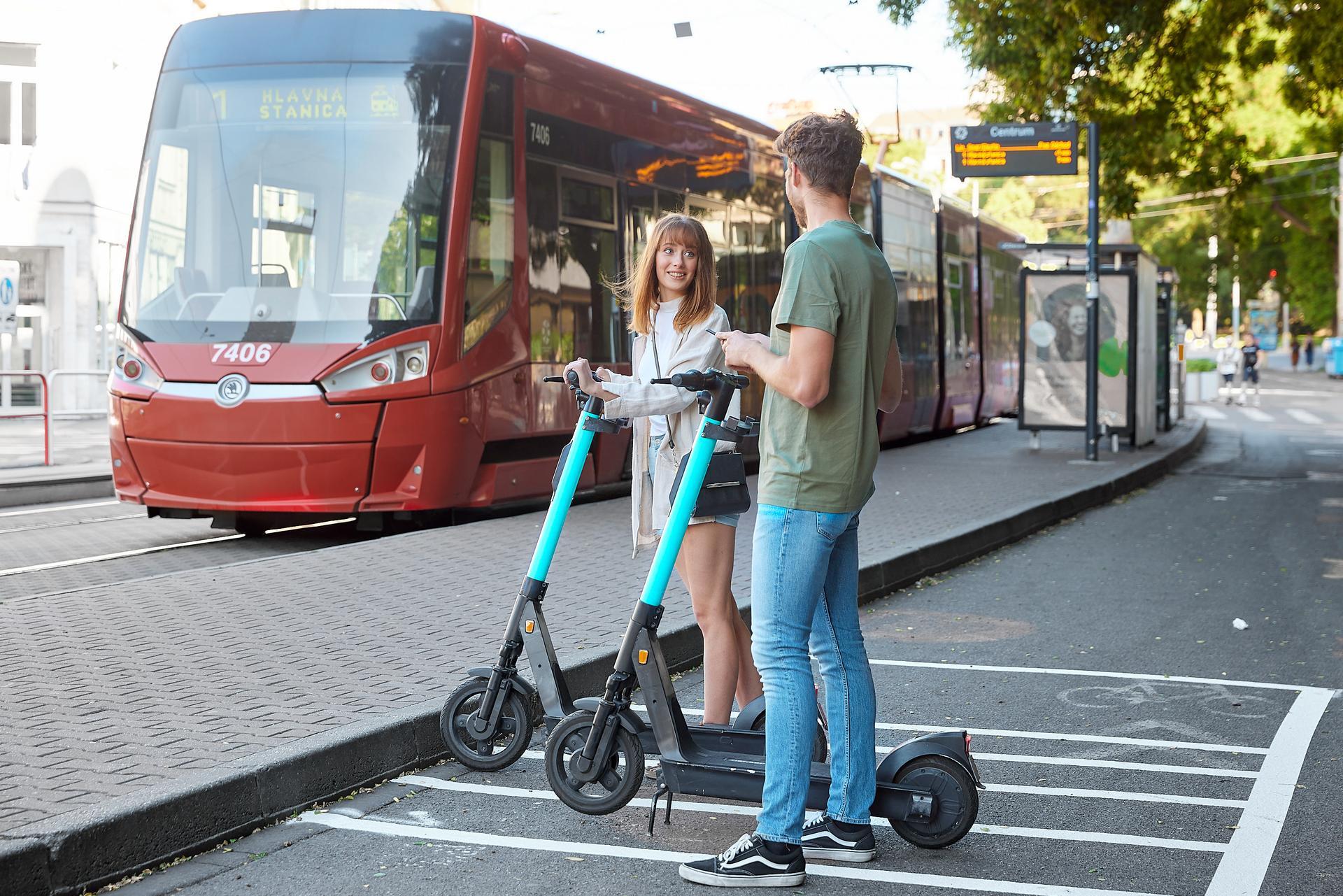
On our journey to offer seamless and sustainable travel experiences to our customers, close collaboration with Public Transport Authorities (PTAs) is essential. Public transport (PT) is the backbone of urban mobility – this is especially true when it comes to the successful deployment of a Mobility-as-a-Service (MaaS) platform. Our data show that 20-50% of TIER trips are first/last mile rides, complementing public transport and highlighting the need for integrated services.
To further link micro-mobility services to PT and strengthen multimodal mobility, it is important to enable the sale of public transport tickets in MaaS apps. In this context, we launched two ticketing pilots with our partners HSL (Helsinki) and Rheinbahn (Düsseldorf) last year, offering PT tickets in the TIER app - in combination with TIER e-scooter rides. The results of our pilots have shown great user interest for joint ticketing as 67% of all TIER packages bought during the pilot period were PT bundles.
To date, Public MaaS solutions generally provide the full offering of public transport ticketing with the possibility to combine their offer with shared mobility. On the contrary, private MaaS operators rarely get access to PT ticket sales, although it could leverage the use of PT by creating attractive offers. In order to better understand the underlying reasons of these limitations and possible solutions, we conducted a study among our partners on open and combined ticketing. This article not only summarizes the results - it also aims at shedding light on the joint visions, barriers and possible solutions to move further in the direction of a truly open MaaS ecosystem.
Why is open and joint ticketing relevant for PTAs ?
Our research includes verbal interviews as well as a survey sent to a dozen of mobility partners, with the aim of discussing the different views on open and combined ticketing. Most of the PTAs already see the potential of opening their ticketing system as a fruitful way of leveraging the uptake of their service. For 70% of PTAs interviewed in our research, offering their tickets through third-party resellers would first and foremost encourage the shift towards more sustainable transport modes and reduce the use of private cars. By digitising and opening their ticketing system, PTAs can strengthen their positioning as “modern and comprehensive mobility service providers”, stresses our partner Florian Petrina, Product Manager Multimodal Mobility on behalf of the PTA Stadtwerke Münster.
Next to strengthening brand positioning, open ticketing systems can open up new sales channels and thereby increase the revenues from ticket sales. Håkan Karlsson, Project Manager - Business Development at SL in Stockholm, even sees it as a way to “attract customers otherwise not reached by public transport”. This could be the case of local commuters who are not heavy users of public transport, or also frequent international travellers who prefer to fulfill their mobility needs with their preferred app instead of downloading and using the local PT or MaaS apps.
As a result, some of our PT partners already opened their tickets to third party resellers either due to strategic reasons (Wiener Linien, Vienna) or legal requirements (HSL, Helsinki). Other partners like Stadtwerke Münster have not yet made their tickets available, but are still working on new sales channels in order to meet the changed customer requirements.
Mapping of the MaaS ticketing ecosystem in Europe
Looking at the European MaaS ticketing ecosystem, we observe certain disparities between countries, but also common trends:
- Already open: Several countries, sometimes only in local regions, have already started opening their PTA’s ticketing systems to private operators. The Nordic countries are the most advanced: NOMAD (Nordic Open Mobility and Digitalization) is an on-going project of a region-wide enabler platform for seamless mobility between countries. Finland has the strongest country legislation, as it grants access to travel information and timetables, and legally obliges PTAs to open their ticketing interfaces. Additional countries have also started to implement interoperable platforms and combined ticketing systems, and are already offering it with a couple of operators in some cities. This is for instance the case of Yumuv, a MaaS app offering mobility bundles in Switzerland.
- Getting there: Other countries have partly opened their ticketing systems or are heading in this direction. In the Netherlands and Austria, governments are planning to make public ticketing services more accessible and flexible to expand it to other forms of sustainable mobility. Some cities are already going one step further: In Vienna, the PTA Wiener Linien has opened its ticket API to third-party resellers for the purchase of short-term tickets (24h, 48h or 72h). In Italy, train tickets from the national railway Trenitalia can be purchased in the private MaaS app Urbi. The same development can be seen in Spain where several PTAs have opened their ticket sales to private MaaS platforms such as Meep.
- Technical and regulatory challenges: Most of the PTAs are facing a set of technical challenges. For some of them, these constraints turned out to become real road blockers. In the UK for instance, the complex ticketing structure and data sharing restrictions currently make it difficult for PTAs to open their API. In this context, regulatory changes will be necessary to enable seamless integration.
- Mostly closed: In some countries, ticketing systems remain mostly closed for various reasons, ranging from legal obstacles to strategic objectives. This is the case in France but also in Germany, where sales and tariff policies are still mainly set by regional transport associations and thus prevent the PTAs from taking their own initiatives.
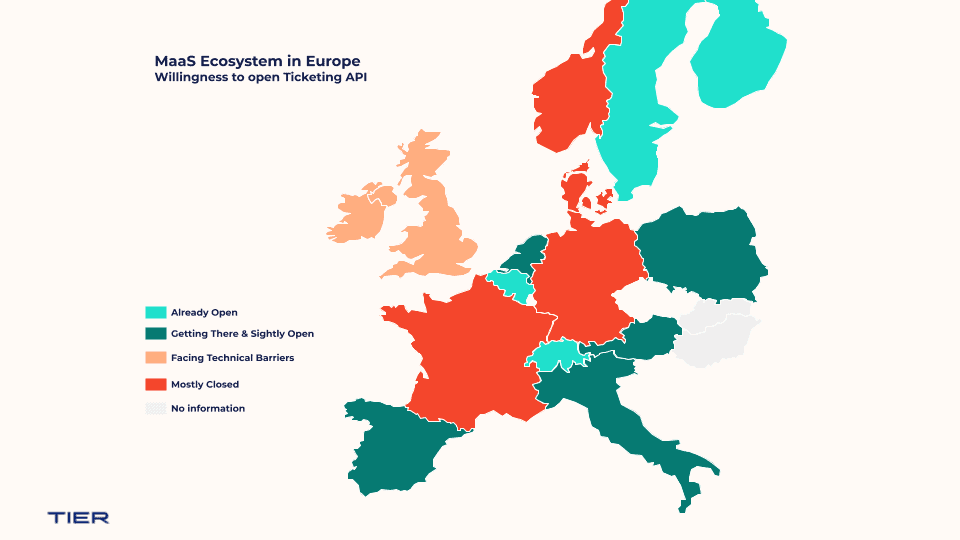
Barriers and levers
As mentioned, most of the PTAs questioned in our research have already demonstrated their interest in open ticketing. However, some remain sceptical, and the underlying reasons are diverse: next to technical and legal barriers, they mostly fear the cannibalization of their own sales channels and the loss of customer control. We clustered the most important barriers by category and added possible levers.
Strategic objectives:
- Most PTAs are currently offering, or planning to offer, their own MaaS solutions. Therefore, if private operators offer PT tickets in their own apps, PTAs could see it as a threat to their objective of becoming the local one-stop-shop for mobility. One example is BVG, which runs Berlin’s local MaaS platform Jelbi and so far also sells its tickets solely through Jelbi and BVG public apps.
- The shift of customer contact is even “seen more as a danger than a challenge” as third party ticket resellers will have the direct control of the end users, mentions Anna Sotschka, Project Manager for Innovation Projects from the PTA VGN. This statement emphasizes the importance for the PTA and its transport companies to remain the first level touchpoint of their customers.
- In addition, PTAs are concerned that private MaaS platforms would favor less sustainable transport modes for profitability reasons. So far, the business model of most MaaS platforms consists of generating commissions by selling single trips. Since the more sustainable modes like walking, biking or PT cannot or barely be monetized, private MaaS operators would incentivize users to use less sustainable, but more profitable options such as cars or taxis.
Potential lever: This strategic paradigme can mostly be changed by a shift of mindset. Mobility operators should be aware that strategic challenges are reciprocal and efforts should come from both sides: While PTAs feel threatened by loss of control and of ownership, micro-mobility operators have already accepted these risks and made compromises by integrating their services in MaaS solutions. Transparent information, stronger communications and bilateral trust are therefore key to encouraging strategic alignments between PTAs and third party resellers. Open ticketing should be perceived as a way of creating additional value to the end consumer and attracting new customers, and thus generating revenue for the operators - both private and public.
In the end, commuters should have the freedom to choose to travel with their prefered app, while accessing several transport modes. Opening API systems bilaterally is therefore the only way of maximising user’s experience.
Technical challenges:
Opening a ticketing system requires transparent and interoperable information. On the PTA side, several challenges are faced:
- The PTA systems and interfaces are often not suitable for third party resellers, and thus not capable of providing tickets via external channels.
- The tariff structures are not always technically mapped to be accessible to other APIs.
- The sales might not be technically identifiable, which might lead to inaccurate reporting and incorrect distribution of the revenues generated.
Potential lever: Removing technical barriers can only work if PTAs and other MaaS players collaborate to develop compatible APIs and ticketing systems, but also to standardize their interface. In fact, as most ticketing systems are currently card centric, an initial shift to account based ticketing is necessary to allow integration with third parties, as highlighted by Martynas Gudonavičius, CEO of Trafi.
Legal and regulatory environments:
- The main issue is that Transport Associations (composed of transport companies, municipalities, regional and state policy-makers) play an important role in defining the channels through which public transport tickets may be sold. This sovereignty makes it hard for PTAs to work with external companies and to develop combined tickets.
- In many countries, the relationships between the PTAs and micro-mobility operators are regulated and have to be non-discriminatory. It means that cooperating with one micro-mobility operator implies to cooperate with all of them, explains our partner Christian Wagner, Head of Department Sales and Advice at Wiener Linien. For the PTAs, this might result in longer strategic positioning processes to define the specific criteria of the partnership. The PTA would have to agree to enter into a cooperation with each interested third party operator.
- Moreover, data protection is seen as a real challenge. Indeed, the European legal framework is not always perfectly aligned with local regulations, which makes it difficult for PTAs to take ownership on opening ticketing. PTAs sometimes also fear that private MaaS operators would not be able to comply with their data protection requirements.
Potential lever: The harmonization of the local regulations is necessary to ease cooperation between PTAs and third party resellers. The European Commission is already going in that direction and has launched several projects to further develop multimodal digital solutions. Among them, the Commission announced a multimodal ticketing initiative for 2022, aiming to sustain the Sustainable and Smart Mobility Strategy (SSMS), and more particularly its objective of “making connected and automated multimodal mobility a reality”(1). This broad ticketing project will have to come along a new legislative framework facilitating the access and use of data, especially travel information, for both business-to-business and business-to-government data (2). Nevertheless, Claudia Sagmeister, Project Manager at MVG in Munich, underlines that a minimum level of data security should be required from MaaS solutions.
TIER’s experience with joint ticketing
Opening ticket channels does not only provide the option to simply resell tickets - it offers a possibility to bundle different mobility solutions and create additional value. A study by the Nunatak Group (2019) found that micro-mobility users were highly interested in the combination of micro-mobility and public transport. 63.5% of customers surveyed were likely to buy such combined tickets for public transport and micro-mobility; it was the preferred choice from a list of four different options which also included purchasing tickets for public transport, bike or car sharing via the micro-mobility user app.
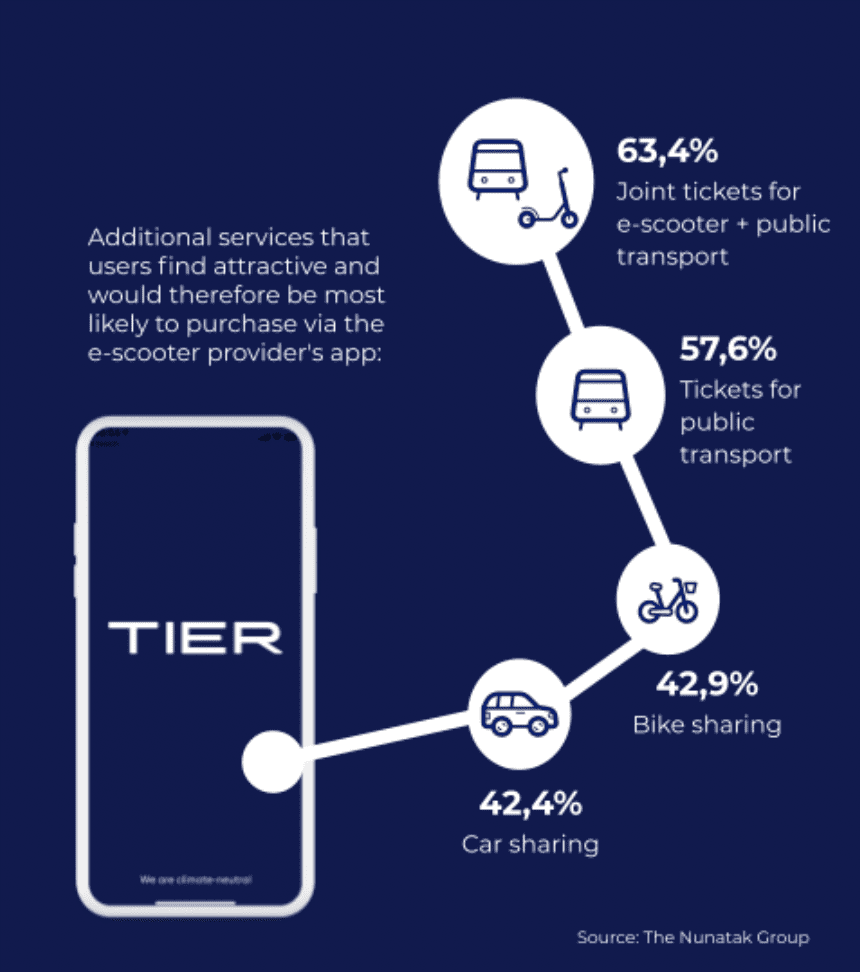
To offer our users more intermodal travel options and test new channels for better connecting micro-mobility and PT, we launched two joint ticketing projects with our partners HSL (Helsinki) and Rheinbahn (Düsseldorf). Our pilot project conducted with HSL in Summer 2020 offered our users bundles including TIER e-scooters trips and public transport tickets in the TIER app. Within six weeks of the trial, we managed to sell close to 4,000 tickets, representing more than 2/3 of all TIER packages bought in this period. In addition, more than 50% of the buyers repurchased the bundle, reflecting the high interest and need for more combined ticketing. In summary, our four key takeaways can be summarized as:
- Customers want to use the TIER app as a multimodal service.
- Customers want to purchase single PT tickets on the TIER platform.
- Customers prefer unlocks over minutes as a free add-on to the PT’s ticket.
- Intermodal packages can change user travel behavior and increase customer retention.
However, based on customer feedback received we also identified room for improvement, especially in regards to the offer itself: Users were particularly interested to purchase long-term packages rather than single tickets, such as monthly tickets or several single tickets.
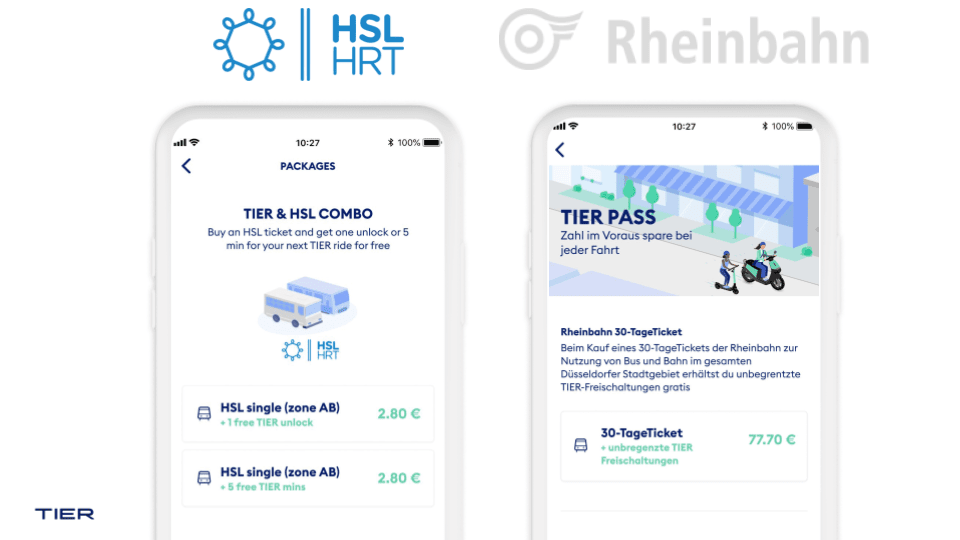
Based on the feedback of this first pilot, we decided to test more long-term bundles. This is why we launched a new project with our partner Rheinbahn in November 2020, which combined Rheinbahn’s monthly pass with our TIER monthly unlimited unlocks pass. Even though the long lasting lockdown last winter hindered high adoption of this offer, we believe that such offers should be tested again with the use of PT returning to pre-pandemic levels.
We learnt that bundles must be designed to meet the various needs and different user segments: business travellers might prefer a daily solution, local residents and heavy PT users could be more interested in monthly/yearly offerings, while occasional commuters could require a more flexible solution. This is particularly important as the pandemic has changed our mobility habits (e.g. decreased need for yearly PT subscriptions).
With some of our MaaS partners, we are already piloting such solutions: In the Yumuv app in Switzerland, which bundles shared mobility services with public transport from the Swiss Federal Railways SBB and the local public transport providers in Basel, Bern and Zürich, users can combine their PT subscription with offers from shared micro-mobility providers like TIER to meet their specific needs (e.g. 60-minutes micro-mobility pass on top of their monthly PT subscription). In Finland, Whim is piloting similar offers, from PT and micro mobility to full mobility subscriptions. Most MaaS players, however, don’t provide bundled offers yet, but some already offer their user intermodal routing options including the combined price estimation, such as MVGo in Munich or Jelbi in Berlin.
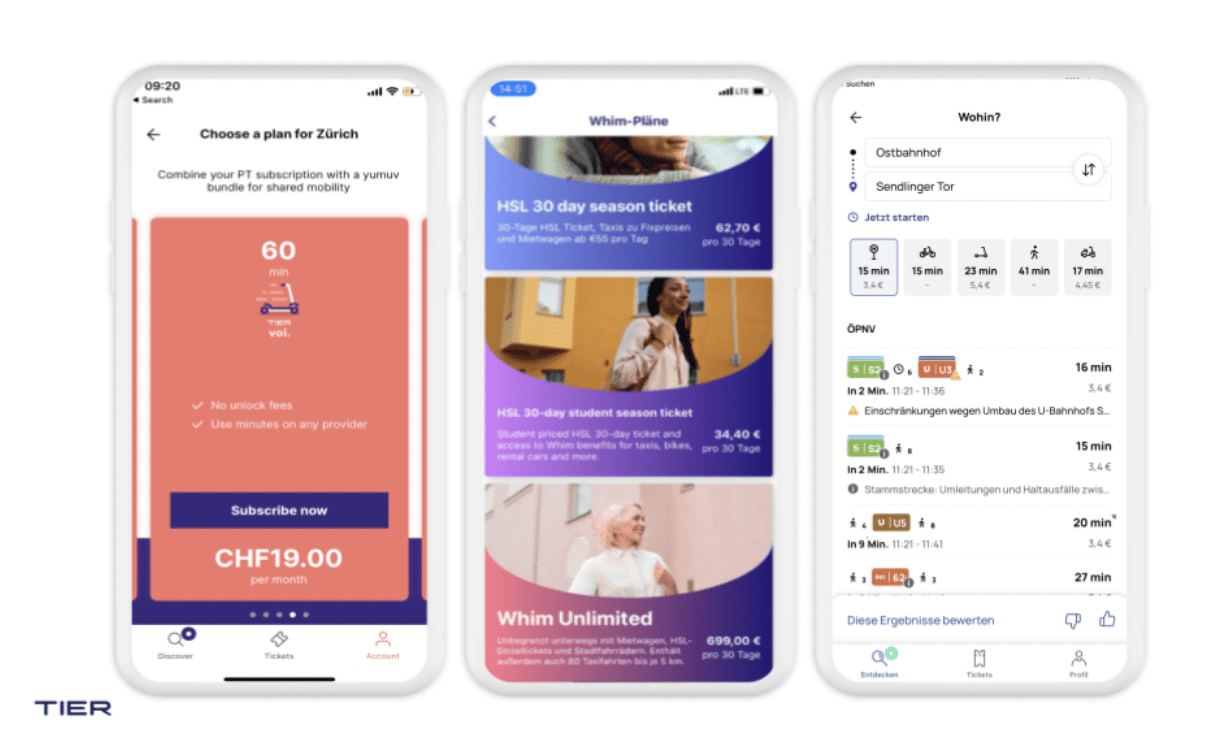
Key Takeaways
In brief, most PTAs have, to date, not opened their ticketing APIs to third parties, either out of legal, technical or strategic reasons. Several PTAs are still facing technical challenges, as their API systems are not compatible with third party apps. Legal and regulatory frameworks can also complexify the process of opening these APIs. On top of that, strategic reasons still play a major role: Several PTAs aim to position themselves as the number one MaaS provider in their cities and want to leverage their ticket offering as a key competitive advantage. However, legal challenges could soon be resolved by the introduction of a European legislation, which would harmonise countries’ regulations and allow for the opening of PTAs’ ticketing systems.
Meanwhile, PTAs and private operators should work on the strategic challenges together by fostering and strengthening their cooperations.
Open and joint ticketing should not only be seen as a fruitful way to leverage PTAs sales and as an attractive offer, but first and foremost as an efficient way to tackle the challenge of creating seamless and environmentally-friendly transportation offers. A stronger collaboration between PTAs and third parties would in the end result in social, environmental and economical profitability, all the components of a sustainable framework.
Thank you to all our partners who contributed to this article by sharing their inputs and experiences!

TIER talks MaaS - related blog posts
TIER talks MaaS - What is hindering the adaption of MaaS
TIER talks MaaS - The way forward for successful MaaS platforms
Sources:
(1)https://ec.europa.eu/transport/themes/mobilitystrategy_en
(2) https://eur-lex.europa.eu/resource.html?uri=cellar:5e601657-3b06-11eb-b27b-01aa75ed71a1.0001.02/DOC_2&format=PDF - Point 37